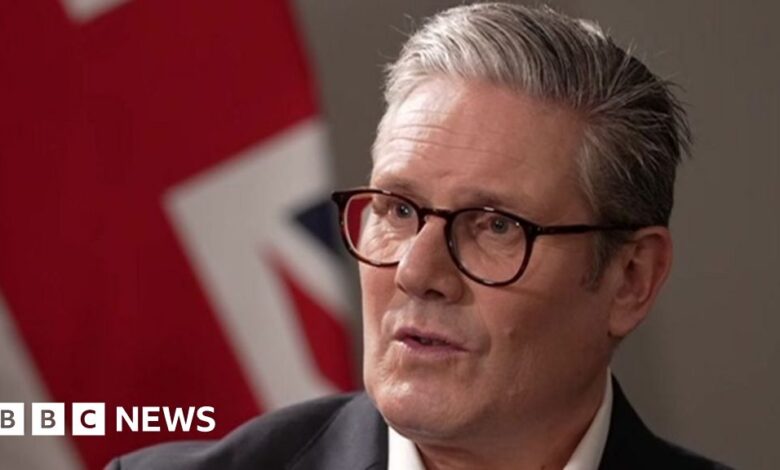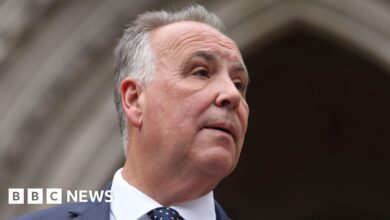‘We can’t change our history’ on slave trade, says Keir Starmer

The UK “can’t change our history”, Prime Minister Sir Keir Starmer has told the BBC when asked about paying reparations to countries impacted by the transatlantic slave trade.
His comments come after diplomatic sources told the BBC that Commonwealth heads of government want to start a “meaningful conversation” about an issue that could mean the UK paying billions of pounds for its historical role in the trade.
Sir Keir, who is currently in Samoa for a meeting of Commonwealth countries, said the trade was “abhorrent” and that it was important to “talk about our history”.
Chancellor Rachel Reeves ruled out making payments, in an interview earlier on Thursday, saying “that’s not something that this government is doing”.
Sir Keir said the focus should be on “today’s challenges” including resilience in the face of climate change and boosting trade between Commonwealth nations.
He added he wanted to help member countries work with international financial institutions to “unlock money that might help them” in relation to climate change.
Leaders from 56 countries are attending the Commonwealth Heads of Government Meeting taking place in Samoa on Friday and Saturday.
Commonwealth leaders are expected to defy the UK and debate ways of securing reparations for historical slavery. At its height, Britain was the world’s biggest slave-trading nation. Downing Street has said the issue is not on the agenda for the summit.
Reparatory justice for slavery can come in many forms, including financial reparations, debt relief, an official apology, educational programmes, building museums, economic support, and public health assistance.
In the run-up to the summit, there have been growing calls from Commonwealth leaders for the UK to apologise and make reparations.
Formally opening the summit on Friday, King Charles said that members of the Commonwealth “know and understand each other such that we can discuss the most challenging issues with openness and respect”.
“Our cohesion requires that we acknowledge where we have come from,” he said.
“I understand from listening to people across the Commonwealth how the most painful aspects of our past continue to resonate.
“It is vital therefore that we understand our history to guide us to make the right choices in the future.
“None of us can change the past, but we can commit with all our hearts to learning its lessons, and to finding creative ways to right inequalities that endure.”
He also spoke of the need to tackle climate change, saying Commonwealth nations should seek to be an “example to the rest of the world”, and paid tribute to his mother, the late Queen Elizabeth II, saying the group “mattered a great deal” to her.
During the gathering, a new Commonwealth secretary general will be elected. All three of the candidates – Shirley Botchwey of Ghana, Joshua Setipa of Lesotho and Mamadou Tangara of Gambia – back reparatory justice.
Speaking to BBC Radio 4’s Today programme on Thursday, Frederick Mitchell, the foreign minister of the Bahamas, said he believed the UK would change its stance, saying: “It may take a while for people to come around but come around they will.”
Mitchell has also urged the UK government to offer an apology, telling the Commonwealth gathering: “It’s a simple matter – it can be done, one sentence, one line.”
Asked if an apology would be offered, Sir Keir said: “Of course, an apology has already been made in relation to the slave trade, and that’s not surprising, it’s what we would expect.”
In 2007, then-Prime Minister Tony Blair apologised for the slave trade. Following talks with the Ghanaian president, he said: “I have said we are sorry and I say it again.”
During the interview with the BBC, Sir Keir was also asked about a complaint Donald Trump’s team has filed against the Labour Party objecting to its staff and activists volunteering for Kamala Harris’s presidential campaign.
“I think this needs to be seen for what it is,” the prime minister said, adding: “It is some Labour Party members and staff in their free time campaigning.
“It’s happened in every election in different parts of the world. All political parties do it… I think it needs to be put in it’s proper perspective.”
Sir Keir added that both he and Trump wanted to have a “good working relationship” and that the pair recently had dinner together.
He dismissed suggestions that his party were still adjusting to being in government, saying he had “absolute clarity” on his “number one mission” of economic growth.
Next Wednesday Chancellor Rachel Reeves, will set out the government’s tax and spending plans in the Budget.
Ahead of this Reeves told the BBC she would be changing the government’s self-imposed debt rules to free up money for infrastructure spending.
Asked about the Budget, Sir Keir said the economy barely grew under the Conservatives and that he wanted to “clear the decks” and “clear up the mess”.
“I believe in running towards problems. If you know what the problem is, what the challenge is, every business knows this, every family knows it, run towards it and fix it.”
The Conservatives have challenged Labour’s argument that they created a £22bn black hole in the economy and questioned the chancellor’s decision to change the debt rules.
The party’s shadow Treasury minister Gareth Davies said “uncertainty over additional borrowing risks interest rates staying higher and for longer.
“It’s families up and down the country who would pay the price.”




